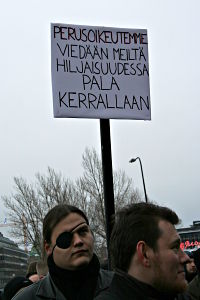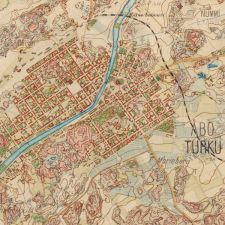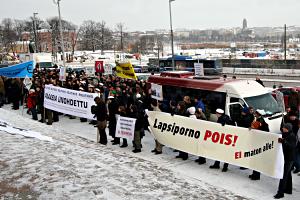Arto's Blog
Privacy and Lex Nokia surveillance law
Posted: 2009-01-31 02:05:49, Categories: Finland, Helsinki, Politics, 484 words (permalink)
 Hand in hand with the introduction of new surveillance systems, methods and laws, personal right to privacy is eroding bit by bit. Latest addition in Finland is the law proposal dubbed as Lex Nokia (full text in Finnish). It has raised quite a few critical voices nationally and got some international attention through EDRI and articles in the Helsingin Sanomat newspaper international edition.
Hand in hand with the introduction of new surveillance systems, methods and laws, personal right to privacy is eroding bit by bit. Latest addition in Finland is the law proposal dubbed as Lex Nokia (full text in Finnish). It has raised quite a few critical voices nationally and got some international attention through EDRI and articles in the Helsingin Sanomat newspaper international edition.
In short, corporate and community Internet subscribers (yhteisötilaajat in Finnish) are about to gain substantial rights to monitor the behaviour of individual users in their networks. Publicly the law has been presented as a means to detect trade secret leaks from companies, but the proposal extends much further than that. For example libraries and university dormitories could check up on their users who they are exchanging emails with or which web pages they are visiting, with the broad excuse of suspicion of violation of network rules. The violation doesn't necessarily mean anything illegal, it is simply something which has been forbidden in the terms of use in that particular network.
There are some restrictions and privacy safeguards mentioned, but the proposal is written so unclearly that it's very difficult to say when exactly snooping would be allowed and when not. I tried but honestly couldn't figure it out. One thing is clear: the Finnish police is only allowed to browse the same kind of private information when the user is suspected of a crime, and minor crimes don't even apply. In other words, corporations and "community subscribers" are getting broader rights than the police. Oops.
There will be a public demonstration against the law proposal in Helsinki on February 5, 2009, starting at 14:30. If you agree with the message and can make it to the parliament house that day, be there! Another interesting related effort is creating two short TV commercials about the law and buying some prime time on one of the national channels to get the message out. The commercials will be aired a few times between Monday 2nd and Wednesday 4th of February.
There is something absurd about concerned private individuals campaigning against a surveillance law by buying airtime on television. Little by little, the world is being shaped towards the fictional reality described in George Orwell's famous book Nineteen Eighty Four (1984). His prediction was just a few dozen years ahead.
Update 17.2.2009: The TV commercials were aired and the public demonstration held, gathering about 300-400 participants. Discussion about the law proposal has continued lively in the media. The proposal has been criticized by the central bureau of police. The youth organization of the conservative party Kokoomus has issued a statement demanding the law proposal to be rejected. It will be interesting to see whether any of the conservative party members in power will follow their wish and vote against it. At least no politician can claim any more not having heard about problems related to the proposal.
New job on environmental and cultural data
Posted: 2008-12-03 22:42:23, Categories: General, Work, Finland, Free software, Literature, Politics, 865 words (permalink)
 My
half-time
work experiment felt good enough that I'm doing it again.
Same employer (CSC), 80 hours per
month contract until end of May 2009. This time I'm working on
services providing storage and access to environmental and cultural
data. There are opportunities to study topics I care about and
participate in making design choices, which makes the deal even more
attractive than last time.
My
half-time
work experiment felt good enough that I'm doing it again.
Same employer (CSC), 80 hours per
month contract until end of May 2009. This time I'm working on
services providing storage and access to environmental and cultural
data. There are opportunities to study topics I care about and
participate in making design choices, which makes the deal even more
attractive than last time.
Geographic information wants to be free
A lot of geographic information and data about natural resources is gathered around the world by governmental research institutes. The U.S. has been fairly open with providing access to such data while in Europe most institutes have been sitting on their databases and selling information with very restricted terms. Now the situation is slowly changing, partly due to an OECD recommendation which suggests open access to research data from public funding. The community maintained OpenStreetMap project has challenged closed models, and increasing popularity of partly open privately funded services such as Google Maps plays a role as well. The INSPIRE EU directive (see also the Ministry of Agriculture and Forestry INSPIRE page in Finnish) aims towards interoperability and sharing of geographical data, although its level of required openness falls behind the OECD recommendation.
In Finland, there's a lot of high quality data but it is scattered and little used outside the organizations collecting it. Many voices are raised in support of open access, for example in the Pätevä seminar two weeks ago. In practice progress is rather slow. The public research institutes are pointing towards the Ministry of Finance and the law about fees of public services (Maksuperustelaki) which their funding models are partly based on. Curiously, the key reason for fees in the law is to avoid causing harm to private companies competing in the same domain. However, many sources show (meteorology example) that business overall benefits from freely available public information. A fundamental change of government policy is needed in order to have open access by default also in Finland.
My first task in October was to contribute a little bit to a survey which reviews the current state of geographic information related data in Finland, and gives suggestions on what should be done. The survey focused on what data exists, how to make it available and usable for officials, researchers and politicians, and interoperability issues between different datasets. For example different coordinate systems and semantics are a big hindrance to cross analysis. I personally believe that increased openness will gradually help to improve lower level data compatibility as well. Fully open access raises strong opinions both in favor and against, but there seems to be a more general consensus that at least researchers should have convenient access to data.
(Added a link to the survey on geographic information related data on May 31, 2009)
Preserving cultural data for the next 100 years
Since beginning of November I'm participating in the National digital library project, which is about access, usability and long term preservation of Finnish cultural data. The Finnish National Archives and the National Library are digitizing old books, newspapers and other documents. In this case, open access gladly seems to be the default for at least old works whose copyrights have expired. You can already check out 18th and 19th century newspapers with full text search or municipal documents dating back until Middle Ages. The picture of this blog entry is part of a map of Turku in 1881, retrieved from the National Archives (see the full map). Several Finnish museums are also digitizing their collections. Many new documents, photos, movies and modern art works are already digital when they are created.
Preserving all this material reliably for tens and hundreds of years is a challenging task. The lifetime of computer and storage systems is around five or at most a couple of dozen years. Text in a paper book stays readable for centuries, but digital data will have to be continuously transferred to new, yet unseen storage systems. Current file formats and software to access them will become outdated over time. Human error or attack can have much greater impact in the digital archive than spilling coffee over one book in a physical library.
CSC does not take part in the digitization, but we are currently working on a preliminary requirements specification for the long term storage. Finland is not the first country thinking about it so there's a lot of material available. However, nobody has a complete and definitive solution to the problem yet. There are chances to do pioneering work and contribute to best practices also internationally.
On a personal level, I find projects on environmental and cultural data both very interesting. One challenge is where to focus energy in order to make a difference instead of getting lost between committee meetings and bureaucracy. Another challenge will be to keep work from ruling life, by reserving enough time for hobbies and rest. In November I already surpassed my 80 hours by 50%, not counting when work topics were in my thoughts during free time. However, that's still less than full time and I don't mind working hard if it feels important and rewarding. The half time contract has been a good starting point.
Special edition of positive news
Posted: 2008-11-18 01:08:44, Categories: General, Ecology, Politics, 104 words (permalink)The most inspiring news last week was The New York Times Special Edition. With headlines like Iraq War Ends, United Nations Unanimously Passes Weapons Ban and New York Bike Path System Expanded Dramatically it brings positive thinking to the world even if the articles don't quite reflect real events — yet. The issue is dated July 4, 2009: there's still seven and a half months to go. All the news we hope to print, as they write on the front page.
Download the pdf and destroy a little bit of natural resources by printing a copy for a friend. Check out the ads too, they're great!
Public demonstration against Internet censorship
Posted: 2008-03-06 17:48:05, Categories: General, Finland, Helsinki, Politics, 153 words (permalink)
 A couple of weeks ago I wrote about Internet censorship in Finland. On Tuesday March 4th there was a public demonstration against the censorship law. I was there in front of the parliament house with about 500 other demonstrators.
A couple of weeks ago I wrote about Internet censorship in Finland. On Tuesday March 4th there was a public demonstration against the censorship law. I was there in front of the parliament house with about 500 other demonstrators.
Lack of interest from the parliament members was rather disappointing. Out of the three big political parties only one (Kokoomus) was represented, with SDP and Keskusta not having sent any representative to hear what we had to say. A few representatives from smaller parties were there, but most of them still didn't seem to understand what the whole thing is about.
Luckily, the journalist who wrote the article about the demonstration in Helsingin Sanomat, the biggest daily newspaper, did get the point. The article is not available online free of charge, but if you can read Finnish and have access to the March 5, 2008 issue of Helsingin Sanomat, check out page A-5. That gives some hope.
Internet censored in Finland
Posted: 2008-02-19 00:42:47, Categories: General, Finland, Politics, 131 words (permalink)Freedom is important for me. Freedom of movement, freedom of assembly, freedom of thought, freedom of speech, right to receive information. The two last ones have been recently violated in Finland. The Finnish police has been maintaining a blocklist of web sites allegedly containing child pornography. Now they have added a Finnish site criticizing the censorship on the same blocklist.
Instead of trying to describe the matter further, I'll point to an excellent summary of what it's all about.
My Internet operator doesn't use the blocklist, at least not yet. However, it's a sad moment when censorship is seen as the official way of silencing critical voices. I certainly hope this farce is going to end soon and the law which originally enabled the creation of the blocklist will be overturned.

Copyright Arto Teräs <ajt@iki.fi>, licensed under the Creative Commons Attribution-Share Alike 3.0 Unported License. (Unless otherwise mentioned in individual photos or other content.)